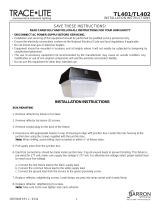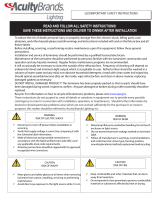Page is loading ...

TL106/EX-EXT
INSTALLATION INSTRUCTIONS
SAVE THESE INSTRUCTIONS!
INSTALLATION INSTRUCTIONS
READ CAREFULLY AND FOLLOW ALL INSTRUCTIONS FOR YOUR OWN SAFETY
• DISCONNECT AC POWER SUPPLY BEFORE SERVICING.
• Installation and servicing of this equipment should be performed by qualified service personnel only.
• Ensure the electricity connections conform to the National Electrical Code and local regulations if applicable.
• Do not mount near gas or electrical heaters.
• Equipment should be mounted in locations and at heights where it will not readily be subjected to tampering by
unauthorized personnel.
• The use of accessory equipment not recommended by the manufacturer may cause an unsafe condition. Any
modification or use of non-original components will void the warranty and product liability.
• Do not use this equipment for other than intended use.
800 533.3948 • www.barronltg.com
1
20070035 REV 2 - 09/13
1. Unhinge refractor and remove reflector.
2. Center the fixture over the junction box and mark the appropriate holes to be drilled to align the housing correctly
over the junction box then secure with hardware provided with junction box.
3. Pull wires through center hole of mounting plate and rear housing.
4. Use additional screws/bolts/fasteners along the housing to secure to the wall.
DO NOT RELY SOLELY ON FASTENERS AT THE JUNCTION BOX.
5. Electrical connections should be made inside junction box. Cap all unused leads to prevent shorting. This fixture is
pre-wired for 277 volt; make sure supply line voltage is 277 volt. For alternate line voltage select proper ballast lead
to match your line voltage.
a. Connect the line fixture lead to the black supply lead.
b. Connect the common fixture lead to the white supply lead
c. Connect the ground lead form the service to the green grounding screw.
6. Use approved connectors to connect fixture leads to supply leads and make wire splices inside junction box.
7. Replace reflectors and install lamp.
8. Replace refractor; make sure that the lens gasket is properly seated around the perimeter of
the lens to ensure a weather tight seal.

/




